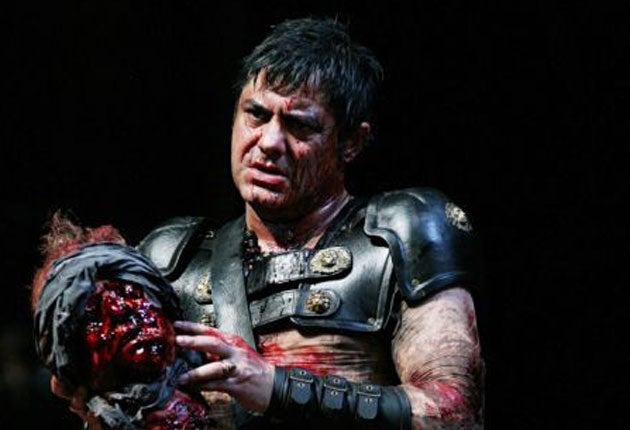Julius Caesar, Roundhouse, London
Friends, Romans, and thugs

Lucy Bailey's determinedly graphic account of Julius Caesar, now transferred from Stratford to London's Roundhouse, begins with an episode that Shakespeare somehow forgot to include. Overshadowed by a huge statue of the she-wolf that suckled them, the adult Romulus and Remus fight to the death like a pair of rabid animals. We're left in no doubt that Rome's very foundations are steeped in fratricidal blood and this prequel sets the tone for a production that energetically rubs your face in the gore of internecine violence.
Mocking Brutus's high-minded need to believe that the conspirators will be "sacrificers, but not butchers", the assassination scene is a protracted, messy shambles, a mixture of nightmare and farce as Greg Hicks's Caesar clings on to the bitter end under a frenzy of stabbing. In the low-life parody of this, the street gang that mistakenly lynches Cinna the Poet rips out the innocent man's heart. There's a pointed moment when Mark Antony, picking up a severed head from the battlefield, casually tosses it as though it were no more than a rugby ball at Octavius Caesar – a detail that seems to sum up the production's rueful take on the dehumanising cost of civil strife.
There's certainly no danger here that the play will be accused of offering a drily intellectual debate about how the democratic process should deal with potential tyranny or an over-academic study of political self-deception. If anything, this staging veers too far to the opposite extreme and I'd argue that it is itself internally divided in terms of technique. The aim is evidently to maximise our awareness of the visceral nature of the drama but the flesh-and-blood presence of the citizens and soldiery seems to me to be drained, rather than reinforced, by the constant use of Bill Dudley's elaborate videos in which the actors have been filmed and digitally multiplied in order to create the illusion of vast crowds.
Projected on to six screens, these hordes have a fatally phantasmal, floating feel and their gestures often look insufficiently connected to what is actually happening on stage; Darrell D'Silva's rabble-rousing wizardry as Antony is diminished, instead of intensified, by the badly timed raised fists of the on-screen wraith-like mob and the kitsch spectacle of the Capitol boiling in lurid CGI flames.
Some rather colourless performances further weaken a sense of subtle, living immediacy. Sam Troughton plays Brutus as a naive, well-meaning, occasionally febrile liberal, but underplays the self-serving righteousness and systematic doublethink of this brainy, chronic bungler. Greg Hicks, though, finds a streak of grim camp comedy in Caesar's here somewhat arch and petty-seeming attempts to conceal encroaching frailty behind a grandiose public image. Bailey brings on his bloody ghost a second time at the end to pre-empt Brutus's suicide by stabbing him first. But Brutus is all too aware that his death represents Caesar's long-term revenge, so this supposedly ironic adjustment, like much else in the production, feels at once striking and excessive.
To 5 February (0844 482 8008)
Join our commenting forum
Join thought-provoking conversations, follow other Independent readers and see their replies
Comments
Bookmark popover
Removed from bookmarks